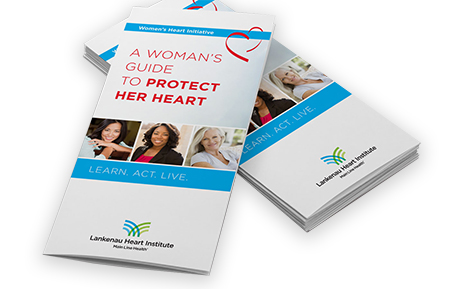A Woman's Guide to Protect Her Heart

Along with the known risk factors like family history, high cholesterol, diet and other lifestyle behaviors, we are seeing a new trend in women having heart risk factors related to pregnancy, menopause, auto immune conditions, even cancer treatment, which are unique to women and are becoming increasingly relevant when assessing risk for heart disease.
We encourage you to learn the truth about heart disease and the risk it poses to women; know how to act, by getting yourself and your loved ones screened and tested; and through this shared action, together we will live.
It’s time to start taking care of you!
Get your free copy of A woman’s guide to protect her heart today (PDF)
Stroke—it can happen to you
If an artery that carries blood to the brain is blocked, that part of the brain can be damaged. This is a stroke. A stroke can cause problems with reasoning, speech and movement. It can even be fatal.
Learn more about women’s stroke risk
Listen to your heart—especially when it skips a beat
It’s normal to have occasional fast, fluttering or skipped heartbeats. However, when arrhythmias are prolonged or cause other symptoms, they’re a problem.
History of preeclampsia? Know your cardiovascular risk
Preeclampsia is a problem that may develop during pregnancy. This condition can lead to health risks for you and your baby during pregnancy, including premature delivery, seizures and stroke.
Learn more about preeclampsia heart risks
Gestational diabetes and your heart
Gestational diabetes is a type of diabetes that occurs only during pregnancy. Not all mothers-to-be develop it, but all women should be tested for it after six months of pregnancy.
Learn more about your heart risk with gestational diabetes
Postpartum cardiomyopathy: A rare but serious risk
Postpartum (or peripartum) cardiomyopathy is a form of heart failure (weakening of the heart muscle) that strikes women at the end of pregnancy or shortly after delivery.
Learn more about postpartum cardiomyopathy
Menopause and heart disease risk
Taking care of your health is important at any age, but it’s even more important after menopause. Learn what you can do for your heart health, then make lifestyle changes and see your doctor for screenings.
Learn more about your heart risk with menopause
After menopause, be mindful of your heart
No matter when you begin menopause, focus on factors you can change—adopt a healthier lifestyle to lower your risk for heart disease, stroke and other health issues. It’s never too late to start.
Learn more about taking care of your heart after menopause
Some cancer treatments may injure your heart
If you have cancer, you might not be thinking about your heart. But it’s good to be aware that certain cancer treatments can harm the heart and blood vessels.
Learn more about your heart risk with some cancer treatments
Essential screening tests for heart health
There are many heart health tests available. Please talk to your health care provider to see which tests are right for you.
Learn more about essential heart screening tests
Have rheumatoid arthritis or lupus? Watch your heart
If you have RA or lupus, it is important to understand your heart disease risks. To live a heart-healthy lifestyle, be proactive and talk to your health care provider regarding your heart risk.
Learn more about your heart risks with RA or lupus
Myths and facts
Learn the truth about some common myths about women and their heart health.